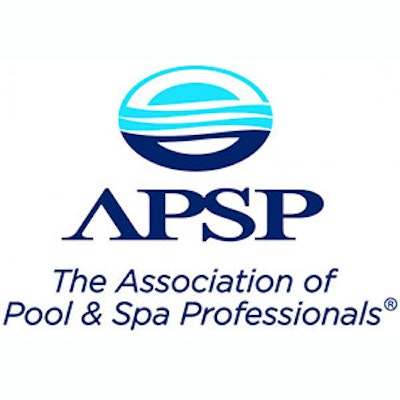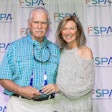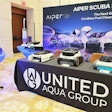
By any measure, 2017 was a good year for the Association of Pool & Spa Professionals. The trade group invested heavily in education and advocacy, its core competencies, and created a commercial council and a networking group for budding pool pros, all while managing to end the fiscal year in the black. Rich Gottwald, APSP's president and CEO, is understandably proud of what his staff, the volunteers and the association's membership accomplished in the past year and the firm footing it has going into 2018.
"It's important that people recognize that we're in the strongest financial position we've been in for at least 15 years," he says. "We have healthy reserves that are allowing us to do things like improving education and certification and putting money into other programs that will benefit our members and help them grow. This is a big deal for us because we're spending money wisely and running the association the way our members run their businesses."
Promoting Professional And Personal Growth
Among the most conspicuous improvements to member benefits in 2017 was APSP's investment in education and certification, an effort aimed directly at helping members address the perpetual problem of finding, training and keeping qualified workers.
"When we talk to our members, that's the No. 1 issue they bring up," Gottwald says. "So what we are doing is taking all the certification programs and putting them online in a modularized format. This way owners can pick and choose what they want to teach their employees without paying for full courses or expensive travel."
One owner who stands to benefit from the new format is Wendy Purser of Hampstead Pool, Spa and Patio in Hampstead, N.C. She knows firsthand how difficult finding good help can be, and says those people she does manage to find often lack basic retail skills.
"As a retail store owner, I am busy with calls and customers and sales, and to get a new employee in and to have some education that I can give them modularly and conveniently is great," she says. "The Retail Sales Associate Program goes over what is acceptable in the store. Really basic things like not being on Facebook or your phone, how to dress, but also things specific to pool and spa retail that are crucial for making a good impression on customers."
Purser can now put these new workers through whatever training she thinks they'll need, including how to run a water test, the basics of how a pool works and what it takes to maintain a pool day to day. Short-term summer help can be easily and inexpensively made useful with a select menu of training, while more career-minded workers can be put on a path toward full certification. Those people will become are more likely to stick around and move up. First, though, they'll need to see opportunity.
Mark Thompson, owner of Absolute Pool & Spa Care just outside of Atlanta, Ga., believes part of the industry's labor problem lies in the fact that few people see much opportunity for themselves in the industry. The association's changes to the education program are a big help, but ultimately it's the owners' responsibility to create a vision of a life in aquatics beyond driving a van and pushing a pole.
That's why Thompson decided to get involved with WAVE, a networking group APSP launched for young professionals in the industry. Think of it as a modern take on an age-old idea, where organized presentations and activities take the place of networking at trade show welcome parties and coffee breaks during seminar sessions.
"We are going to do about three WAVE events each year," says Thompson, who is active in the program's Georgia chapter. "The intent is to do some shorter seminars to keep people more engaged, but also to create an environment afterwards where they can bond with other people in the industry and start to see, 'Wow, there really is something to this industry! It's bigger than just this job I'm doing!' Also, the seminars don't just have to be about swimming pools and spas."
For example, Pentair Aquatic Systems recently gave a short talk about variable-speed pumps, and NC Brands gave a presentation on specialty chemicals. Next, Thompson stepped in and led a discussion about goal setting. He asked attendees to set their 10-year goals. Then, after being asked to consider how they'd want the important people in their lives to remember them, they made another set of goals, often with changes reflecting newfound priorities. The feedback he got from the exercise was "incredible," and Thompson knew he had something important brewing.
"We want to help the younger generation create a vision for their future, because I don't want them to be 65 years old sitting on a couch thinking back on their lives wondering, 'What the heck did I do with my life?'" he says. "Many of the guys commented that it made them look into themselves more deeply than they ever had before. It was very heartwarming and inspirational."
From there, attendees were taken to Andretti Speedway for some driving and socializing.
Craig Sears, owner of Sears Pool Management Consultants, Inc., in Atlanta, Ga., was at the event, too, and applauds the work APSP has done with WAVE.
"Getting young people in through the door is tough, and once they are in, it's difficult getting them to see a future in the pool industry," he explains. "This shows them that the industry has a lot to offer, and I'm really looking forward to seeing how the WAVE program goes. It's been encouraging."
RELATED: APSP Approves #1.3 Million Education Revamp
Legislation And Regulation
Another of APSP's important roles is serving as the industry watchdog. It's also the one people tend to overlook when assessing the value the association delivers for the $599 annual dues it collects from builders, service professionals and retailers.
"Advocacy is really the one thing they do that doesn't get talked about and touted enough," says Rebecca Smith of Splash Pool Management Company in Dallas, Ga. "Many members don't realize how many conversation are had on their behalf, and it's really hard to put a price tag on it. You can't say, 'APSP watching the state legislatures saved me X dollars last year.'"
Purser says this hard-to-quantify benefit doesn't usually seem all that important to a specific company. It's always someone else being dinged for an infraction, or having local leaders threatening to put the squeeze on energy or water usage from pools and hot tubs, right? Tell that to Purser and she'll set you straight. Sooner or later you're likely to need help yourself, and that's when the value snaps into focus.
"Without a trade organization behind you, a state or local authority isn't going to give that much credence to your claims if you go in to fight an unfair regulation," she explains. "But if you go in representing a larger group that has already established contact with them, they're going to listen."
Purser cites a recent case in nearby Raleigh, N.C., where OSHA had levied fines against a builder. Luckily, another builder in another state had successfully fought the same fines, thus setting a precedent.
"So he was able to call us and get all that information quickly and share it with his attorney to help him settle the matter. Plus, we were able to help the builder a little bit financially," she says. "He was a member, so we jumped in. If you're not a member you're going to have to spend days trying to hunt down this information on your own."
Rich Gottwald, APSP's president and CEO, says APSP has always served this important function, but it's been able to watch more closely and respond more rapidly to issues that arise since partnering with Stateside, a legislative and regulatory tracking firm, a few years ago.
Stateside is a company that monitors issues at the federal and state levels and, according to Gottwald, they've flagged more than 2,200 proposed laws and regulations impacting the pool and spa industry during the first 11 months of the year. Some of the proposals can be quickly dismissed, but many are identified as worthy of a fight and get forwarded on to local chapters or are dealt with directly by the association's staff.
"That's a big part of what we do and why we exist," he says. "Our mission is to ensure unnecessary laws and regulations do not get adopted. We get in there and kill those things so our members don't have to deal with them."
Commercial Council
In addition to focusing on in its longstanding priorities, APSP expanded its scope by forming the Commercial Council. Plans were hammered out during meetings in Orlando last fall, but the idea had been bouncing around for a while.
"APSP has been seen as a residential pool association," Gottwald says. "We're not, and we do have a lot of members involved in the commercial space, but there are more and more unique issues with commercial products. So we held a meeting and agreed to form a council that will focus on standards, codes and legislative issues that are facing that sector because there is a void to fill. We are expanding our worldview to make sure we are truly representing the entire aquatic industry."
The plan is an ambitious one with an aggressive schedule. Association staff and volunteers are working on a strategy document to spell out what the council will do and identify key issues. Gottwald expects the new council to be up and running by early spring.
Sears, and others in the commercial segment, welcomed the news.
"I think it's long overdue," he says. "The association does a fantastic job of representing the members, but the primary focus has been on residential construction and service. This new council is recognition that the commercial side of things is just as important. There are fewer of us in it, but you are talking about things that affect public health."
Had the council been around during the debate over the Virginia Graeme Baker Pool & Spa Safety Act, he says, the association would have had easier access to the technical data it needed to educate lawmakers in Washington.
To Gottwald and others at APSP, the new council and the other improvements it made in 2017 are merely further fulfillment of the association's mission of representing the entire pool and hot tub industry. Retailers in Rochester, builders in Boca Raton, service pros in Seattle and everyone in between make up APSP's membership. Together they form a firewall against burdensome regulation and serve as a loud advocate for the products and services of a wide-reaching and diverse industry.
Toward that end, the association set up shop in a new outpost way west of its headquarters outside of Washington, D.C.
RELATED: APSP Announces Director for New Western Office
California Here We Come
In the same way APSP has always represented the commercial segment, it has always represented a large contingent of pool and spa pros in California and other Western states. But Gottwald says sending a person out there to focus specifically on the area made good sense.
"We hired Jennifer Farwell to represent all the services APSP offers to its members, and to make sure they are being delivered effectively on the West Coast, primarily in California and Arizona for the moment," he says, adding that eventually other states in the region will be added. "The things she will be representing include our improved educational programming, where she'll be working with our chapters and our members. She'll be making sure they're aware of our online offerings, the legislative actions that are happening in the West, and then of course engaging as appropriate on regulatory and legislative issues on behalf of the industry.
"We've always been a national association and we've always had many, many members in California. We just identified a growing need going forward."
With Farwell touting the benefits of membership out West, and state chapters representing their diverse membership elsewhere across the country, APSP has a legion of staff and volunteers eager to spread the word about all the association has been doing to add value for its members.
But Thompson needs no convincing about the value the association delivers.
"If you're asking if I think APSP is worth it, I would say without a question," Thompson says. "Not only is it what you get with the discounts and education, but I've also seen it from the back end, where we had to fight bills that went through the state capitol. Without money from APSP, we never could have done any of that, because we're just volunteers."
Purser is similarly enthusiastic about APSP's role in the industry. She's been a member for almost 40 years, and is beginning her first term on the board of the Retail Council after serving in various other capacities over the years. She points out that membership has benefits that go far beyond education, advocacy and promotion.
"You really should be a member and help both the industry and yourself," Purser says. "Really, any respectable business should be a part of their trade organization, and shoppers do research today and are more confident purchasing from a company that belongs to a trade organization.
"We educate our customers about our products and they'll say, 'I didn't know that' or, 'Nobody else told me this.' Well, I'm a member of the APSP and we have all the new technical information, all the new codes, and we're aware of everything we need to know about to build or service your pool."
The Workforce Of The FutureTaskforce identifies ways to attract and train tomorrow's pool pros. The APSP ended 2017 on an upswing. Membership grew again, and annual dues were put to good use with improvements to education and certification and healthy investments in protection against regulatory and legislative overreach. But as much as was accomplished, members continue to struggle with one big problem – finding people to do the necessary building and service. The association assembled a taskforce to explore workforce issues, and hopefully to find a fix for the problem plaguing so many member firms. "The goal of the Workforce Development Taskforce is to get people to understand that this industry can be a great place to work, to make a nice living, to support a family and to have a nice career," says Seth Ewing, director of membership and business development for APSP. "We want to understand the issues that get in the way of this understanding and figure out how to get people interested in the industry." Of the many ideas considered from other industries and professions, an apprenticeship model of training and certification has drummed up the most excitement. "It would be similar to what professional trades like electricians do," Ewing explains. "You bring somebody in and they're an apprentice electrician for a couple of years, then they become an electrician and eventually work toward becoming a master electrician." Gottwald is quick to point out that the apprenticeship model is merely one idea, and that the lack of unified nationwide codes also presents a huge hurdle. He's careful not to raise expectations too high, but is committed to exploring all options to help APSP members gain access to a talented workforce. Still, Jon Krawczyk of Superior Pools in Part Charlotte and Fort Myers, FL, loves the idea. "That would be huge!" he says. "When people think about pools, they don't know all that goes into it. But working in the pool business is not just a job; it's a good career. And having something like an apprentice program would be a big help in changing that attitude and getting people interested in the industry." |


































